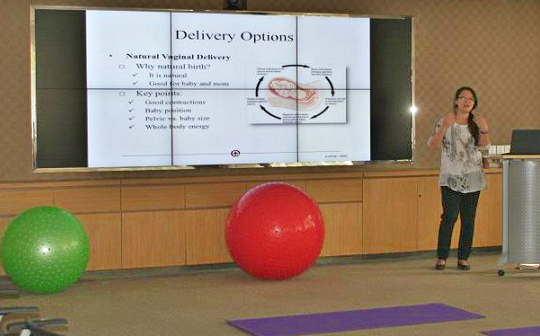A while ago, I attended a Childbirth Workshop co-hosted by Dr. Juliette Kinn, OB-GYN at Oasis Hospital. I had found the experience reassuring and enlightening, even for a second time mom like me. As a doctor with a baby of her own, Dr. Kinn was approachable, empathetic, and answered the hesitant questions of first-time parents with humorous anecdotes from her own pregnancy and childbirth experience.

I might be expecting my second child already, but many of my friends are still waiting to have their first child. A few of them have begun trying, a few are still trying to find the right moment, and others are still not sure if they’re ready. While this pregnancy came rather quickly, I remember how difficult it was to get pregnant the first time around. My husband and I had been married for about six years already, but I had never been on birth control (not recommended, by the way), and so we were quite worried when getting pregnant wasn’t as easy as we thought it would be. From the time we had finished our negotiations and decided it would be time to start “trying”, to the time we actually found ourselves pregnant, almost a year had passed. I don’t know if this is normal, but I actually had to try harder and focus on improving my own physical constitution before it seemed I had finally fostered a good enough environment for pregnancy. As such, one of the questions that I had posed for Dr. Kinn was what she would recommend women who want to become pregnant to pay attention to if they want to have a healthy pregnancy.

1. Know yourself
First you should know your medical background and your family medical history for any genetic issues that could affect your fetus. Genetic problems should be identified from one’s family history and disclosed to your partner and doctor so that genetic tests can be run during the pregnancy to pre-screen for said issues.
2. Get checked up
See a doctor for a women’s wellness checkup (clinical examination and blood test) and ensure that you are in good health before you start trying to get pregnant. If you know you have certain health issues, get them under control first. Common problems that should definitely be taken care of prior to pregnancy are: obesity, diabetes, and dysthyroidism (thyroid malfunction). You should confirm you’re up to date on your vaccinations, such as Rubella, which can cause fetal malformation.
3. Stop birth control
If you’re on birth control, and you’ve thoroughly thought it through, been checked up, and so forth—you should stop taking your pills or getting your shots, etc. We asked Dr. Kinn if it’s true that women should stop birth control “earlier” because of hormone imbalances and such, but she said it’s a myth. Women should stop birth control when they are ready for pregnancy, not six months before. You could become pregnant as soon as the next cycle after stopping birth control.
4. Be healthier
Dr. Kinn emphasizes the importance of lifestyle risk prevention. Women should eat a balanced diet and exercise routinely to maintain their physique. Be careful of any medications you’re on, and check with your doctor before buying any over the counter medications as some, such as ibuprofene, can be contraindicate during pregnancy.
Of course, you should also stop taking recreational drugs, drinking alcohol, and smoking tobacco because you never know when you’ll be pregnant.
5. Relax
When asked about home remedies for women struggling to get pregnant, Dr. Kinn said that it depends on the problem. Some couples have infertility issues (get checked up if you’ve failed to get pregnant after one year of regular and unprotected intercourse), which can be treated based on the cause of infertility, such as a blocked fallopian tube or anovulation.
For most women, Dr. Kinn advises to just relax, enjoy, and don’t focus on “making a baby”, but instead, focus on “making love” and the baby will come with your love.
Oasis Hospital’s next free Childbirth Workshop will be held on Saturday, July 16th. The workshop is about three to four hours long, including a break for lunch (order your own salad) and a tour of the maternity ward.
Photo: courtesy of Oasis Hospital




